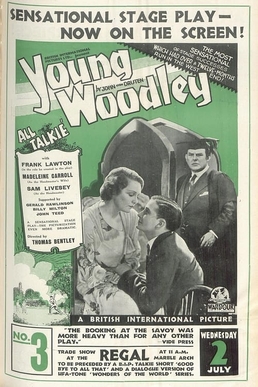
John William Van Druten was an English playwright and theatre director. He began his career in London, and later moved to America, becoming a U.S. citizen. He was known for his plays of witty and urbane observations of contemporary life and society.

Evelyn Laye was an English actress and singer known for her performances in operettas and musicals.

The Theatre Guild is a theatrical society founded in New York City in 1918 by Lawrence Langner, Philip Moeller, Helen Westley and Theresa Helburn. Langner's wife, Armina Marshall, then served as a co-director. It evolved out of the work of the Washington Square Players.
Relatively Speaking is a 1965 play by British playwright Alan Ayckbourn, originally titled Meet My Father, his first major success.
Antigone, also known as The Antigone of Sophocles, is an adaptation by the German dramatist Bertolt Brecht of Hölderlin's translation of Sophocles' tragedy. It was first performed at the Chur Stadttheater in Switzerland in 1948, with Brecht's second wife Helene Weigel, in the lead role. This was Brecht's first directorial collaboration with Caspar Neher.
Thomas Bentley was a British film director. He directed 68 films between 1912 and 1941. He directed three films in the early DeForest Phonofilm sound-on-film process, The Man in the Street (1926), The Antidote (1927), and Acci-Dental Treatment (1928).
Robin Chalk is an English actor in film and theatre. His work includes the West End production of Dirty Dancing and the science-fiction film Moon directed by Duncan Jones. He appeared in the film Alleycats directed by Ian Bonhote and the computer games Until Dawn and Need for Speed: Payback.

Frank Lawton Mokeley was an English actor.
Shinpa (新派) is a modern form of theater in Japan, usually featuring melodramatic stories, contrasted with the more traditional kabuki style. Taking its start in the 1880s, it later spread to cinema.

Young Woodley is a 1930 British drama film directed by Thomas Bentley and starring Madeleine Carroll, Frank Lawton, Sam Livesey, and Gerald Rawlinson.

After Office Hours is a 1932 British romantic drama film directed by Thomas Bentley and starring Frank Lawton, Viola Lyel and Garry Marsh.
Loyalties is a 1922 play by the British writer John Galsworthy. It was first staged at St Martins Theatre and ran for over a year. Galsworthy described it as "the only play of mine which I was able to say, when I finished it, no manager will refuse this". The original West End cast included Ernest Milton, Edmund Breon, Eric Maturin, Malcolm Keen, Ian Hunter, Cathleen Nesbitt, Beatrix Thomson, and Meggie Albanesi.

Birds of Prey, also known in the United States as The Perfect Alibi, is a 1930 British mystery film produced and directed by Basil Dean, from a screenplay he co-wrote with A.A. Milne from Milne's play which was known as The Perfect Alibi in the United States and The Fourth Wall in the United Kingdom. The film stars Dorothy Boyd, Robert Loraine, Warwick Ward, C. Aubrey Smith, Frank Lawton, and Robert Loraine, and was produced at Beaconsfield Studios by Associated Talking Pictures.
The Fourth Wall is a mystery play by the British writer A.A. Milne. It was first staged at the Haymarket Theatre in 1928. Under the name, The Perfect Alibi, it was produced at the Charles Hopkins Theatre on Broadway from November 1928 through July 1929.
Young Woodley may refer to:
Young Woodley is a 1928 British silent drama film directed by Thomas Bentley and starring Marjorie Hume, Sam Livesey and Robin Irvine. The film was never released, and was subsequently remade by Bentley as a sound film Young Woodley in 1930. It was made at Cricklewood Studios. It was based on the play Young Woodley by John Van Druten. This silent version was released to the home movie market running 8 x 200 ft reels, standard 8mm on Amber Stock.
London Wall is a play by the British writer John Van Druten that was first staged in 1931. It based on the romantic entanglements of the staff at a firm of British solicitors in London. It premiered in May 1931 and ran for 170 performances at the Duke of York's Theatre in the West End. The play remained largely forgotten until it was rediscovered by the Finborough Theatre with a production in 2013 and a subsequent West End adaptation at the St James Theatre. In 2014 the play received its American Premiere when it was staged by Mint Theater Company in New York City, this production was filmed and later broadcast as part of the WNET Off-Broadway Series, Theater Close Up.

Peter Godfrey was an English actor and film director. Founder of the experimental Gate Theatre Salon in 1925, with his first wife Molly Veness, he staged London's first expressionistic production in the following year. He went into partnership with Velona Pilcher in 1927 and together they opened the Gate Theatre Studio in Villiers Street, Charing Cross. Eventually moving to Hollywood, he established a career as a film actor and director.

The Druid Circle is a 1947 play in three acts written by John Van Druten. It has a medium-sized cast, slow pacing, five scenes, and three settings. A history professor, frustrated to be working at a university near the border of England and Wales, discovers a love letter written by one of his students to a girl. After humiliating them both, the Professor realises too late the meanness of his actions when it rebounds on him. The play's title comes from "Druid", British academic slang denoting a erudite scholar who has lost his sense of humanity, with "Circle" indicating a group of the same.
Somebody Knows is a 1932 mystery play by the British writer John Van Druten about an entertainer who is accused of strangling a prostitute. Following a court case there is not enough evidence to convict him, leaving the audience unsure of his actual guilt.









